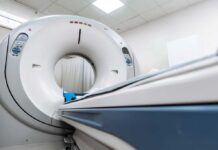
Every 40 seconds, someone in the U.S. has a stroke, but did you know 80% of these strokes are completely preventable?
At a Glance
- Life Line Screening (LLS) offers preventive health screenings, targeting adults aged 50 and older.
- LLS has screened over 11 million people since its founding in 1993.
- 80% of strokes and cardiovascular diseases are preventable with early detection and lifestyle changes.
- LLS’s mass screenings face criticism for potential overdiagnosis and false positives.
The Rise of Preventive Screenings
Life Line Screening (LLS) has emerged as a major player in the preventive health industry since its inception in 1993. Founded by Colin Scully and Timothy Phillips in Florida, LLS aims to make health screenings accessible and affordable for adults aged 50 and over. By 1998, LLS had screened over 500,000 people, and its expansion continued with the inclusion of finger-stick blood testing in 2007 and atrial fibrillation screening in 2008.
Every 40 seconds, someone in America has a stroke – YouTube
Despite its success, LLS has been both praised and criticized. On one hand, it provides early detection for cardiovascular diseases and strokes, which are leading causes of death in the U.S. On the other hand, the accuracy and necessity of mass screenings have been questioned due to potential false positives and negatives, leading to unnecessary follow-up procedures.
Why so many people are having strokes in their 20s, 30s and 40s: ‘We’ve never had patients so young’ https://t.co/3XGVTV1nBs pic.twitter.com/yMXVFfZD9u
— New York Post (@nypost) June 3, 2025
Current Developments and Challenges
In 2023 alone, LLS screened over 630,000 individuals at more than 15,000 locations, identifying 10,000 critical and 46,000 abnormal results. The company continues to expand through mobile clinics and partnerships with community organizations. It emphasizes rapid result delivery and immediate notification for critical findings, positioning itself as a vital service for early detection and prevention.
However, the debate over the value of such preventive screenings is ongoing. Many healthcare professionals and public health authorities argue that mass screenings might lead to overdiagnosis and increased healthcare costs without clear evidence of benefits on a population level. The U.S. Preventive Services Task Force (USPSTF) recommends targeted screenings rather than universal ones for certain conditions, reflecting a more conservative approach compared to LLS’s offerings.
Impact and Future Prospects
The impact of LLS on individual health is significant, with testimonials of life-saving detections. Yet, the broader implications are complex. Short-term benefits include early detection of asymptomatic conditions and timely medical intervention. Long-term, these screenings could potentially reduce morbidity and mortality from strokes and cardiovascular disease, provided they lead to effective treatments and lifestyle changes.
Economically, the out-of-pocket costs for consumers could be offset by healthcare savings if early detection prevents costly acute events. However, there is also a risk of increased costs from unnecessary follow-ups due to overdiagnosis. Socially, these screenings raise health awareness among older adults, but they also risk causing anxiety or false reassurance.


















